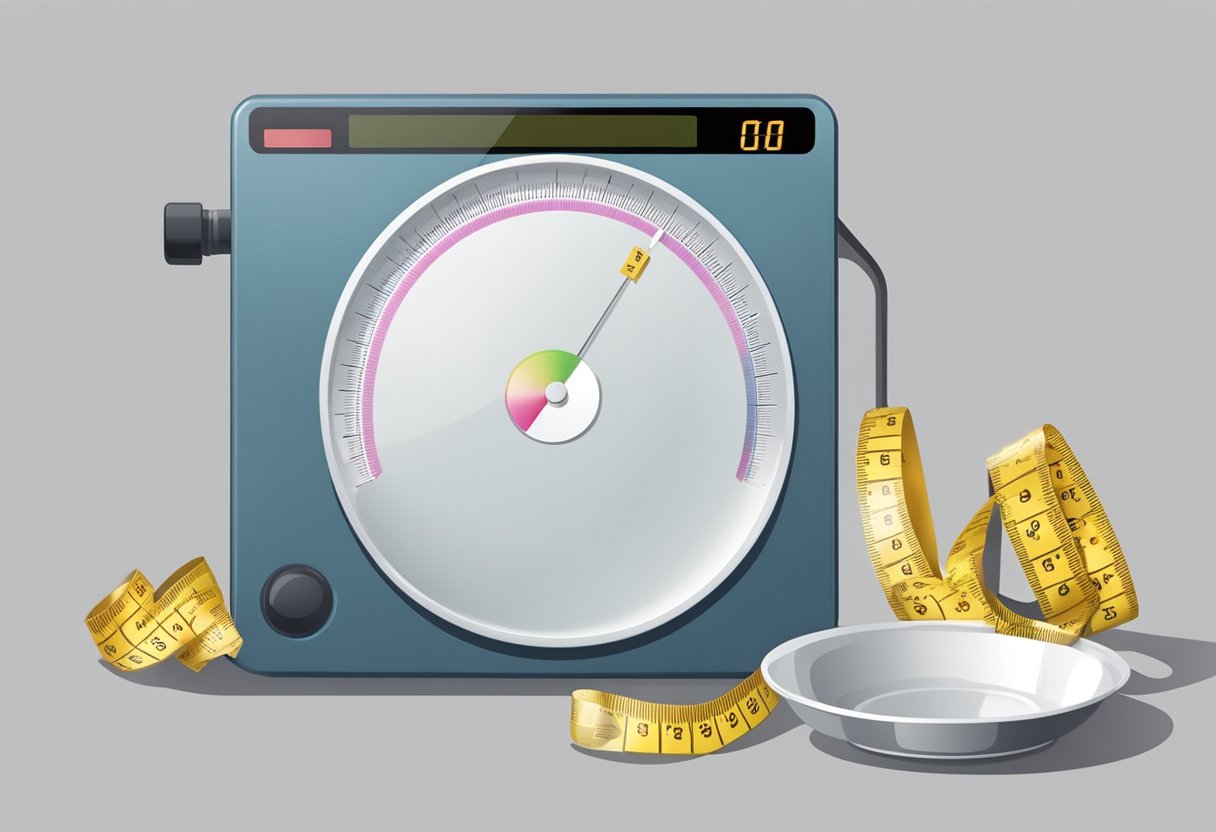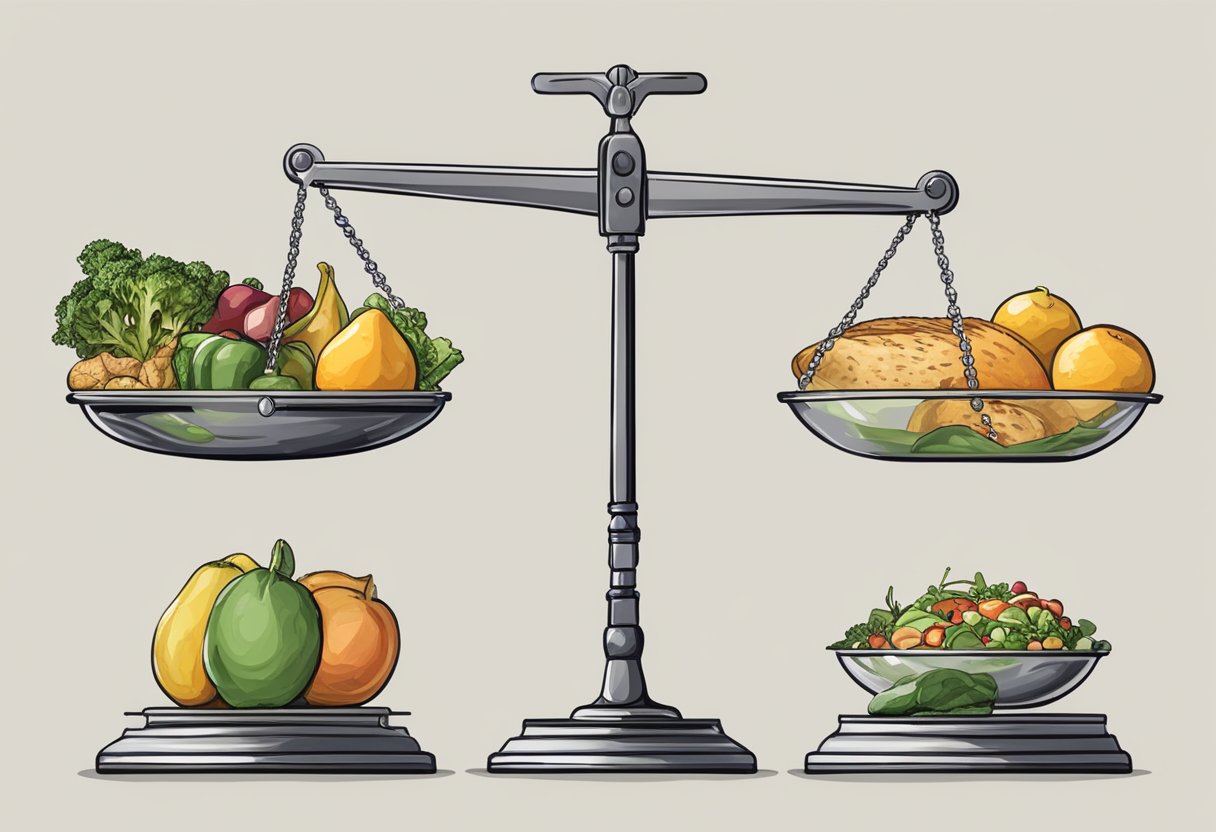One Meal a Day (OMAD) is a type of intermittent fasting that has gained popularity in recent years. The concept behind OMAD is to restrict daily calorie intake to a single meal, typically consumed within a one-hour window.
This approach to eating has been touted as an effective method for weight loss, as it creates a calorie deficit by limiting the number of meals a person consumes in a day.

The question remains, though: is OMAD good for weight loss? While some evidence suggests that OMAD can be an effective tool for weight loss, it’s important to understand the potential health implications and nutritional considerations associated with this type of eating pattern.
This article will explore the benefits and drawbacks of OMAD for weight loss, as well as offer practical tips and strategies for those considering this approach to eating.
Key Takeaways
- OMAD can be an effective tool for weight loss, but it is not suitable for everyone.
- Health implications and nutritional considerations must be taken into account before starting an OMAD diet.
- Practical tips and strategies can help those considering OMAD for weight loss achieve their goals.
Understanding OMAD

The Basics of OMAD
OMAD stands for “One Meal A Day,” which is a type of intermittent fasting and time-restricted eating.
As the name suggests, OMAD involves eating only one meal per day and fasting for the remaining 23 hours. During the one-hour eating window, the individual can eat whatever they want without any calorie restrictions.
It is important to note that OMAD is not a diet plan but rather a lifestyle change that requires discipline and consistency.
OMAD is believed to help individuals lose weight by creating a calorie deficit, which is the key to weight loss. By eating only one meal, the individual is consuming fewer calories, which can lead to a calorie deficit.
Additionally, OMAD may help regulate blood sugar levels, improve insulin sensitivity, and reduce inflammation.
History of One Meal a Day
OMAD has been practiced for centuries, with some religious and cultural traditions advocating for fasting for extended periods. However, OMAD has gained popularity in recent years due to the rise of intermittent fasting and time-restricted eating.
The concept of OMAD is not new, but it has gained attention due to the growing body of research that supports the benefits of intermittent fasting and time-restricted eating. However, it is important to note that OMAD is not suitable for everyone, and individuals with underlying health conditions should consult with their healthcare provider before starting OMAD.
Health Implications

One Meal a Day (OMAD) is a type of intermittent fasting that involves eating one meal per day and fasting for the remaining hours. While OMAD is gaining popularity as a weight loss strategy, it is important to consider the potential health implications.
Impact on Metabolism
OMAD may have a positive impact on metabolism by increasing the body’s ability to burn fat for energy. A 2020 study found that time-restricted eating, a form of intermittent fasting that limits the eating window to a specific time period, can induce weight loss and loss of fat mass [1].
OMAD is a more extreme form of time-restricted eating, which may lead to even greater weight loss and metabolic benefits.
Blood Sugar Regulation
OMAD may help regulate blood sugar levels, which is important for individuals with type 2 diabetes or metabolic syndrome. A 2018 study found that intermittent fasting can improve insulin resistance and blood sugar levels [2].
However, it is important to note that OMAD may cause low blood sugar levels, especially for individuals taking certain medications or with a history of low blood sugar.
Effects on Cholesterol and Blood Pressure
OMAD may have a positive effect on cholesterol and blood pressure levels. A 2019 study found that intermittent fasting can improve cholesterol levels and reduce blood pressure [3]. However, more research is needed to determine if OMAD specifically has these effects.
Potential Risks and Side Effects
OMAD may have several potential risks and side effects. Some individuals may experience fatigue, dizziness, headache, or difficulty concentrating during the fasting period. OMAD may also interact with certain medications or medical conditions, so it is important to consult with a healthcare provider before starting this diet.
Nutritional Considerations

When considering the One Meal A Day (OMAD) diet for weight loss, it is important to take into account the nutritional considerations. Here are some key points to consider:
Caloric Needs and Nutrient Density
It is important to ensure that the one meal consumed during the day provides adequate calories and essential nutrients required by the body. According to the Diet Doctor, the one meal should provide enough calories to meet the daily caloric needs.
For example, if a person requires 2000 calories per day, then the one meal should provide 2000 calories. It is also important to ensure that the meal is nutrient-dense and includes a variety of foods such as fruits, vegetables, grains, and nuts.
Managing Hunger and Satiety
Hunger and satiety are important aspects to consider when following the OMAD diet. According to a study published in Forbes, time-restricted eating can help manage hunger and satiety.
The study found that time-restricted eating can lead to a reduction in appetite and an increase in feelings of fullness. It is important to listen to the body’s hunger and fullness signals and adjust the meal accordingly.
Incorporating Balanced Meals
Incorporating balanced meals is essential for maintaining good health while following the OMAD diet. The meal should include a balance of macronutrients, including protein, carbohydrates, and healthy fats.
According to Verywell Health, a balanced meal can help regulate blood sugar levels, reduce cravings, and promote satiety. It is also important to incorporate a variety of foods to ensure that the body receives all the necessary nutrients.
OMAD for Weight Loss

Intermittent fasting diets, such as the One Meal a Day (OMAD) diet, have gained popularity in recent years as a weight loss strategy. OMAD involves eating only one meal a day, typically within a one-hour window, and fasting for the remaining 23 hours. But is OMAD an effective weight loss method?
Assessing the Efficacy
Studies have shown that intermittent fasting diets, including OMAD, can lead to weight loss [1]. However, the evidence is limited, and more research is needed to determine the long-term efficacy of OMAD for weight loss.
Calorie Deficit and Fat Loss
To lose weight, one must create a calorie deficit, which means consuming fewer calories than the body burns. OMAD can help create a calorie deficit by limiting the amount of food consumed in a day.
By eating only one meal, it can be easier to control caloric intake and promote fat loss [2].
Long-Term Sustainability
While OMAD may lead to weight loss, it may be difficult to sustain in the long term. Restricting food intake to one meal a day can lead to an unhealthy relationship with food and may not provide enough nutrients for optimal health [3].
Therefore, it is important to consult with a healthcare provider before starting any new diet or exercise regimen to ensure it is safe and appropriate for individual health needs.
Sources:
Special Considerations

When it comes to the One Meal A Day (OMAD) diet, there are several special considerations that need to be taken into account.
While OMAD is generally considered safe for most people, certain groups may need to approach this diet with caution.
OMAD for Diabetics
For individuals with diabetes, it is important to consult with a healthcare professional before starting the OMAD diet.
This is because OMAD can cause fluctuations in blood sugar levels, which can be dangerous for people with diabetes. In some cases, OMAD may not be a safe option for individuals with diabetes.
OMAD During Pregnancy and Breastfeeding
Pregnant women and breastfeeding mothers have unique nutritional needs, and it is important to ensure that these needs are being met.
The OMAD diet may not provide enough calories and nutrients for pregnant or breastfeeding women, and may even be harmful to the health of the mother and baby.
OMAD for Different Age Groups
While OMAD can be a safe and effective weight loss strategy for some adults, it may not be appropriate for children, teens, or older adults.
Children and teens have different nutritional needs than adults, and may require more frequent meals to support their growth and development. Meanwhile, older adults may also have different nutritional needs and may require more protein and other nutrients to maintain muscle mass and bone density.
OMAD for Individuals with Eating Disorders
For individuals with a history of disordered eating or eating disorders, OMAD may not be a safe option.
Restricting food intake to a single meal per day can trigger disordered eating behaviors and may be harmful to an individual’s physical and mental health. In these cases, it is important to consult with a healthcare professional before starting the OMAD diet.
Practical Tips and Strategies

When following the OMAD diet for weight loss, there are a few practical tips and strategies that can help individuals achieve their goals.
Meal Planning and Timing
Meal planning is an essential aspect of the OMAD diet.
It is crucial to plan the meal in advance to ensure that it is balanced and provides all the necessary nutrients.
It is also important to time the meal appropriately to ensure that it fits into the individual’s daily routine.
For example, if someone is more active during the day, they may want to schedule their meal in the afternoon or early evening to ensure that they have enough energy to complete their activities.
Hydration and Beverage Choices
Staying hydrated is essential when following the OMAD diet.
Drinking water throughout the day can help individuals feel full and reduce the risk of overeating during the meal.
Calorie-free beverages such as black coffee and tea can also be consumed during the fasting period.
However, it is important to avoid sugary drinks and alcohol as they can add unnecessary calories and disrupt the body’s natural hunger cues.
Incorporating Exercise
Incorporating exercise into the daily routine can help individuals achieve their weight loss goals faster.
Exercise can help burn calories and build muscle, which can increase metabolism and aid in weight loss.
However, it is important to consult a healthcare professional before starting any exercise program, especially if there are underlying health conditions.
Consulting Healthcare Professionals
Before starting the OMAD diet, it is essential to consult a healthcare professional, such as a registered dietitian.
A healthcare professional can provide guidance on how to follow the diet safely and ensure that the individual is getting all the necessary nutrients.
They can also monitor the individual’s progress and make adjustments as needed.
Comparative Analysis

OMAD vs. Other Fasting Methods
OMAD is a type of intermittent fasting that involves eating one meal a day and fasting for the remaining 23 hours.
This method is different from other fasting methods such as alternate day fasting and time-restricted eating (TRE), which involve longer fasting windows and shorter eating windows.
A study conducted in 2022 compared the effects of OMAD and TRE on weight loss. The study found that both methods were effective in reducing body weight and body fat.
However, OMAD was found to be more effective in reducing body weight and body fat than TRE.
OMAD and Ketogenic Diet
OMAD can be combined with a ketogenic diet, which is a low-carbohydrate, high-fat diet that has been shown to be effective for weight loss.
The combination of OMAD and a ketogenic diet can lead to faster weight loss and better metabolic health.
Research has shown that a ketogenic diet can increase the production of ketones, which are molecules produced by the liver from fat.
Ketones can be used as an alternative fuel source for the body, which can lead to increased fat burning and weight loss.
OMAD in Animal Studies
Animal studies have shown that OMAD can lead to weight loss and improved metabolic health.
A study conducted in 2020 found that mice that were fed one meal a day had lower body weight, reduced fat mass, and improved glucose tolerance compared to mice that were fed ad libitum.
Another study conducted in 2021 found that rats that were fed one meal a day had lower body weight, reduced fat mass, and improved insulin sensitivity compared to rats that were fed ad libitum.
Frequently Asked Questions

What are typical weight loss results after following an OMAD diet for 30 days?
The amount of weight loss can vary from person to person, but some studies suggest that people can lose up to 1-2 pounds per week on an OMAD diet.
However, it is important to note that weight loss is not the only indicator of health. Other factors such as body composition, energy levels, and overall well-being should also be taken into consideration.
How much weight loss can generally be expected from a week of eating just one meal a day?
Again, the amount of weight loss can vary from person to person, but some people may experience a weight loss of 1-2 pounds per week on an OMAD diet.
However, it is important to note that weight loss is not the only indicator of health. Other factors such as body composition, energy levels, and overall well-being should also be taken into consideration.
What are the potential side effects of adhering to an OMAD diet?
Some potential side effects of adhering to an OMAD diet can include fatigue, headaches, dizziness, and irritability.
It is important to listen to your body and make sure that you are getting enough nutrients and calories to support your body’s needs.
How long is it recommended to maintain the OMAD diet for optimal weight loss?
There is no set time frame for how long someone should maintain an OMAD diet for optimal weight loss.
It is important to listen to your body and make sure that you are getting enough nutrients and calories to support your body’s needs.
Some people may find that they can maintain an OMAD diet long-term, while others may need to switch to a different eating pattern after a certain amount of time.
Can following an OMAD diet specifically help in reducing belly fat?
There is some evidence to suggest that intermittent fasting, including the OMAD diet, may help reduce belly fat.
However, more research is needed to fully understand the relationship between intermittent fasting and belly fat reduction.
Is the OMAD diet considered a safe method for achieving weight loss?
The OMAD diet can be safe for some people. However, it is important to talk to a healthcare professional before starting any new diet or exercise program. The OMAD diet may not be appropriate for everyone. This is especially true for those with certain medical conditions or who are pregnant or breastfeeding.